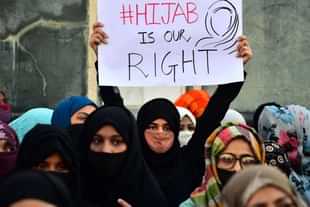Politics
Essential Religious Practice Or Individual Choice? Hijab Activists Should First Make Up Their Mind On Why They Insist On Wearing It To Classrooms
Harsha Bhat
Sep 22, 2022, 02:21 PM | Updated 03:46 PM IST
Save & read from anywhere!
Bookmark stories for easy access on any device or the Swarajya app.


‘The Karnataka High court should not have gone into the question of essential religious practice’.
This was an oral remark made by Justice Dhulia who is part of the Supreme Court bench that is hearing the hijab case, on Tuesday.
Solicitor General of India, Tushar Mehta, while agreeing that the Karnataka High court could have avoided getting into the essential religious practice (ERP) question, said that it was the petitioners who had approached the High Court with the argument that the hijab was indeed an ERP.
How, then, is one to hold the Karnataka High Court responsible for addressing the concern that the petitioners raised?
The conflict arose around December last year, in Udupi, Karnataka. Schools had been running as usual, until one fine morning, a bunch of students decided to ‘demand the right‘ to sport the hijab inside the classroom.
Soon, it snowballed into a matter of public order with those in ‘solidarity’ with the hijab-donning students disrupting regular classes, taking to the streets, and inciting reaction from ‘saffron shawl sporting’ students who also ‘revolted’ demanding similar rights.
Bereft of all ornamentation of legal-talk, at its core the demand of the students was to disobey the rules of the said educational institution regarding the uniform.
Chaos and disorder followed, schools had to be shut and the academic schedule disrupted.
The petitioners then demanded justice from the Karnataka High Court, claiming that the hijab was an ‘essential religious practice’.
Arguing for the petitioners, lawyer Devdutt Kamat had stated that "religious practice cannot be tested on the secular thoughts or any other consideration outside the religious authority...What constitutes an essential practice has to be determined on religions beliefs alone and not based on secular notions.”
The petitioners had even called it a ‘national practice’; one that is permitted by Kendriya Vidyalayas and thus, their argument was the state could not call it ’non-essential’.
However, now, when the SC is hearing the bunch of petitions against the Karnataka HC order, they want the apex court to NOT look at it as being an essential religious practice.
On 12 September, advocate Yusuf Mucchala, representing the petitioners, had responded to court, saying that “Somebody must have done (raising the issue of essential religious practice) erroneously in enthusiasm. But the Court should know its limits..”.
Mucchala also argued that it was not a ‘religious denomination’ that was pleading before the Court but an individual seeking the right to sport the hijab. Hence, according to him, the question of ERP wont come into question.
“So far as individual's rights are concerned, there is no question of application of essential religious practice. That question comes only when a religious denomination is asserting its right” he argued, as reported.
That being the case, it would do well for all fighting for cause of hijab to clarify their stand for the record: do they think that the hijab should be allowed inside classrooms because it is an essential religious practice of a denomination, or should it be allowed as a matter of individual choice?





